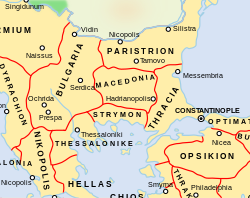Cometopuli dynasty
[6] In 969 AD and following the Russo-Byzantine conquest of Eastern Bulgaria, count Nikola assumed control of the Bulgarian lands west of the rivers Iskar and Struma.By the time of the Byzantine conquest of Preslav and the dethronement of Tsar Boris II in 972, Nikola had been killed and the rule assumed by his four sons, David, Aaron, Moses, and Samuil.Samuel proved to be a successful leader inflicting a major defeat on the Byzantine army commanded by Basil II at the Gates of Trajan and retaking north-eastern Bulgaria.In 1003 a major offensive along the Danube resulted in the fall of Vidin after an eight-month siege, and in 1004 Basil II defeated Samuel in the battle of Skopje and took possession of the city.[9] Some 14,000 Bulgarians were captured; it is said that 99 out of every 100 men were blinded, with the remaining hundredth man left with one eye so as to lead his compatriots home, earning Basil II the moniker "Bulgaroktonos", the Bulgar-Slayer.[7] When the soldiers arrived in Samuel's residence in Prespa, the Bulgarian Emperor suffered a heart attack at the grisly sight and died two days later, on 6 October.[21][22] George Ostrogorsky discusses the issue and concludes that to its creators and to the Byzantines it was simply Bulgarian kingdom, but for various geographical, political and religious factors he labels their state Macedonian Empire.[26][16] For example, in his history of the medieval Balkans, Fine notes:"Until the late nineteenth century both outside observers and those Bulgaro-Macedonians who had an ethnic consciousness believed that their group, which is now two separate nationalities, comprised a single people, the Bulgarians.


BulgarianByzantine GreekFirst Bulgarian EmpireByzantineSamuelWestern Bulgarian KingdomNicholasSredetsPrespaArmenianStepanos AsoghikPaulicanMichael PalairetShishmanRusso-Byzantine conquest of Eastern BulgariaStrumaPreslavBoris IISamuilStrumicaSerresDupnitzaConstantinopleBasil IIGates of TrajanThessalyEpirusDukljabattle of Skopjeat KleidionGavril RadomirIvan VladislavPresianAlusianPeter (II) DelyanByzantine EmpireByzantine conquest of Bulgariaempress of ByzantiumPeter II Delyanuprising in 1040 – 1041strategosMaria of BulgariaJohn II KomnenosComitaNikolaRipsimiaof ArmeniaSamuelof BulgariaAgathaIvanVladislavMiroslavaGavrilRadomirCatherineIsaac IKomnenosPeterDelyanBitola inscriptionArchbishopric of Justiniana Prima and all BulgariaBulgarian PatriarchateTheme of BulgariaJohn FineByzantinologistsCold WarGeorge OstrogorskyDimitri ObolenskySkopjeBitolaregion of MacedoniaKutmichevitsatheme of MacedoniaAdrianopleMacedoniaNorth MacedoniaMacedonian historiographySlavic MacedonianSamuil's InscriptionHistory of BulgariaArmenians in BulgariaDennis P. HupchickAsoghikDerjanUniversity of Michigan PressWorld History EncyclopediaArchbishop of AchridaClement of OhridLeibniz AssociationLos AngelesUniversity of California PressCambridge University PressOstrogorsky, GeorgeJoan HusseyDe GruyterRoyal housesBulgariaSmiletsTerterSratsimirOttomanBattenbergSaxe-Coburg and GothaBulgarian monarchsFirst EmpireAsparuhTervelKormisoshTeletsTelerigKardamOmurtagMalamirPresian IBoris IVladimirSimeon IPeter IByzantinesPresian IIPetar DelyanTihomirConstantine BodinSecond EmpirePeter IIIvan Asen IKaloyanIvan Asen IIKaliman Asen IMichael Asen IKaliman Asen IIMitso Asen